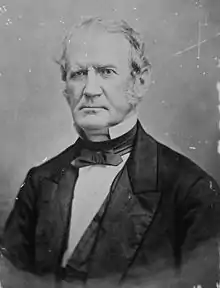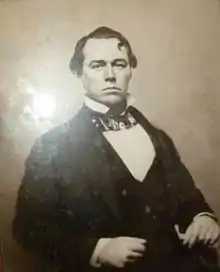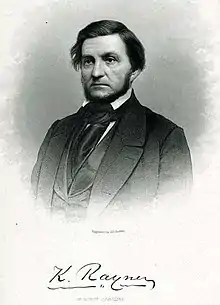North Carolina General Assembly of 1835
The North Carolina General Assembly of 1835 met in Raleigh from November 16, 1835 to December 22, 1835. The assembly consisted of the 137 members of the North Carolina House of Commons and 65 senators of North Carolina Senate elected by the voters in August 1835. This was the last assembly elected before the amendments to the Constitution of North Carolina from the North Carolina Constitutional Convention of 1835 took effect. Thus, the House of Commons included representatives from towns (also called Districts) and the number of members of the house was greater than 120. William H. Haywood, Jr was elected speaker of the House of Commons and Charles Manley was elected clerk. William D. Mosely was elected President of the Senate and William J. Cowan was elected Clerk. Richard Dobbs Spaight, Jr. was elected the Governor by the assembly and served from December 10, 1835 to December 31, 1836. He was the last governor of North Carolina to be elected by the General Assembly.[1][2][3][4][5][6][7]
| 60th North Carolina General Assembly (1835) | |||||
|---|---|---|---|---|---|
| |||||
| Overview | |||||
| Legislative body | North Carolina General Assembly | ||||
| Jurisdiction | North Carolina, United States | ||||
| Meeting place | Raleigh | ||||
| Term | 1835 | ||||
| Senate | |||||
| Members | 65 Senators (one per county) | ||||
| Speaker | William D. Moseley | ||||
| Clerk | William J. Cowan | ||||
| Assistant Clerk | Daniel Coleman | ||||
| Doorkeeper | Thomas B. Wheel | ||||
| Assistant Doorkeeper | Green Hill | ||||
| House of Commons | |||||
| Members | 137 Delegates | ||||
| Speaker | William H. Haywood, Jr | ||||
| Clerk | Charles Manley | ||||
| Assistant Clerk | Edmund B. Freeman | ||||
| Doorkeeper | Isaac Truitt | ||||
| Assistant Doorkeeper | John Cooper | ||||
| Sessions | |||||
| |||||
Councilors of State
The General Assembly elected the following individuals to the Council of State on December 4, 1835:[6]
- Allen Rogers, Wake County (elected President of the Council)
- Thomas B. Haywood (elected Secretary of the Council)
- William Shepperd Ashe, New Hanover County
- Peter H. Dillard, Rockingham County
- Louis D. Henry, Cumberland County[note 1]
- Henry Skinner, Perquimans County
- Daniel Turner, Warren County[8]
- George Williamson, Caswell County
William Hill continued to serve as the North Carolina Secretary of State[9] Samuel F. Patterson was elected by the assembly to serve as North Carolina State Treasurer in 1835. John Reeves Jones Daniel was elected to serve as North Carolina Attorney General.
Membership of the assembly
House of Commons members





There were 137 delegates in the House of Commons, two from each of the 65 counties and one from each of the seven towns/Districts. They elected William H. Haywood, Jr. from Wake County as their Speaker and Charles Manly from Wake County as their Clerk.[3][1][2][6]
| County/Town | Delegate |
|---|---|
| Anson | Jeremiah Benton |
| Anson | John A. McRae |
| Ashe | Jonathan Horton |
| Ashe | Taliaferro Witcher |
| Beaufort | Henry S. Clark |
| Beaufort | S. Smallwood |
| Bertie | John F. Lee |
| Bertie | Thomas H. Speller |
| Bladen | B. Fitzrandolph |
| Bladen | Robert Lyon |
| Brunswick | Abram Baker |
| Brunswick | William R. Hall |
| Buncombe | Nathaniel Harrison |
| Buncombe | Joseph Pickett |
| Burke | Edward J. Erwin |
| Burke | James H. Perkins |
| Cabarrus | George Barnhardt |
| Cabarrus | Levi Hope |
| Camden | J.S. Burgess |
| Camden | James N. McPherson |
| Carteret | James W. Hunt |
| Carteret | Thomas Marshall |
| Caswell | Stephen Dodson |
| Caswell | Littleton A. Gwinn |
| Chatham | R.C. Cotten |
| Chatham | John S. Guthrie |
| Chowan | William Beyrum |
| Chowan | Thomas S. Hoskins |
| Columbus | Thomas Frink |
| Columbus | Marmaduke Powell |
| Craven | John M. Bryan |
| Craven | Abner Neale |
| Cumberland | Dillon Jordan |
| Cumberland | David McNeill |
| Currituck | Joshua Harrison |
| Currituck | Alfred Perkins |
| Davidson | Charles Brummell |
| Davidson | George Smith |
| Duplin | James K. Hill |
| Duplin | Owen Rand Kenan |
| Edgecombe | S. DeBerry |
| Edgecombe | Joseph J. Pipkin |
| Franklin | Thomas Howerton |
| Franklin | Simon G. Jeffreys |
| Gates | Lemuel Riddick |
| Gates | Whitmell Stallings |
| Granville | Charles R. Eaton |
| Granville | Elijah Hester |
| Greene | James Harper |
| Greene | Thomas Hooker |
| Guilford | Ralph Gorrell[10] |
| Guilford | Jesse H. Lindsay |
| Halifax | Sterling H. Gee |
| Halifax | William M. West |
| Haywood | John L. Smith |
| Haywood | Joseph H. Walker |
| Hertford | R.C. Borland |
| Hertford | Kenneth Rayner |
| Hyde | R.M.G. Moore |
| Hyde | John L. Swindell |
| Iredell | James A. King |
| Iredell | Solomon Lowdermilk |
| Johnston | James Tomlinson |
| Johnston | Kedar Whitley |
| Jones | John H. Hammond |
| Jones | James W. Howard |
| Lenoir | Windall Davis |
| Lenoir | Council Wooten |
| Lincoln | Henry Cansler |
| Lincoln | Michael Hoke |
| Macon | James W. Gwinn |
| Macon | Jacob Siler |
| Martin | Raleigh Roebuck |
| Martin | Alfred M. Slade[11] |
| Mecklenburg | J.A. Dunn |
| Mecklenburg | James M. Hutchison |
| Montgomery | William Harris |
| Montgomery | Peter R. Lilley |
| Moore | John O. Kelly |
| Moore | John A.D. McNeill |
| Nash | Samuel Brown |
| Nash | Ford Taylor |
| New Hanover | Charles Henry |
| New Hanover | John R. Walker |
| Northampton | William E. Crump |
| Northampton | Roderick B. Gary |
| Onslow | Daniel S. Sanders |
| Onslow | Daniel Thompson |
| Orange | James Forest |
| Orange | John Stockard |
| Pasquotank | Thomas Bell |
| Pasquotank | John B. Muse |
| Perquimans | Josiah T. Granberry |
| Perquimans | Jonathan H. Jacocks |
| Person | Robert Jones |
| Person | James M. Williamson |
| Pitt | J.L. Foreman |
| Pitt | Macon Moye |
| Randolph | William B. Lane |
| Randolph | Zebedee Rush |
| Richmond | John R. Buie |
| Richmond | George Thomas |
| Robeson | Oliver K. Tuton |
| Robeson | Alexander Watson |
| Rockingham | Blake W. Brasswell |
| Rockingham | Philip Irion |
| Rowan | John Clements |
| Rowan | Jesse W. Wharton |
| Rutherford | John H. Bedford |
| Rutherford | Joseph M.D. Carson |
| Sampson | Isaac W. Lane |
| Sampson | Dickson Sloan |
| Stokes | Caleb H. Matthews |
| Stokes | John F. Poindexter |
| Surry | Thomas L. Clingman |
| Surry | Mordecai Fleming |
| Tyrrell | Thomas Hassell |
| Tyrrell | Charles McCleese |
| Wake | William Henry Haywood, Jr. |
| Wake | Allen Rogers |
| Warren | John H. Hawkins |
| Warren | Thomas I. Judkins |
| Washington | A. Davenport |
| Washington | Uriah H. Swanner |
| Wayne | Calvin Coor |
| Wayne | Giles Smith |
| Wilkes | William Horton |
| Wilkes | Benjamin F. Martin |
| Yancey | Samuel Byrd |
| Yancey | May Jervis |
| Town of Edenton | Hugh W. Collins |
| Town of Fayetteville | Thomas L. Hybart |
| Town of Halifax | Robert C. Bond |
| Town of Hillsborough | William Alexander Graham |
| Town of New Bern | Matthias Evans Manly |
| Town of Salisbury | William Chambers |
| Town of Wilmington | Edward Bishop Dudley[note 2][12] |
Senate members

There were 65 Senators in the Senate, one from each of the 65 counties in North Carolina.[4][1][2]
| County/Town | Senator |
|---|---|
| Anson | Alexander Little |
| Ashe | John Gambill |
| Beaufort | James O'Kelly Williams |
| Bertie | Alexander W. Mebane |
| Bladen | George Cromartie |
| Brunswick | Frederick Jones Hill[13] |
| Buncombe | Hodge Rabun |
| Burke | Peter Ballew |
| Cabarrus | David Long |
| Camden | Thomas Tillett |
| Carteret | James West Bryan[14] |
| Caswell | James Kerr |
| Chatham | Hugh McQueen |
| Chowan | William Bullock |
| Columbus | Caleb Stephens |
| Craven | Thomas J. Pasteur |
| Cumberland | Duncan McCormick |
| Currituck | Daniel Lindsay, Jr. |
| Davidson | John A. Hogan |
| Duplin | John E. Hussey |
| Edgecombe | Benjamin Sharpe |
| Franklin | Henry G. Williams |
| Gates | William W. Cowper |
| Granville | James Wyche |
| Greene | Wyatt Moye |
| Guilford | James T. Morehead |
| Halifax | Andrew Joyner[15] |
| Haywood | Ninian Edmonston |
| Hertford | John Vann |
| Hyde | William Selby |
| Iredell | John M. Young |
| Johnston | Josiah Houlder |
| Jones | James Harrison |
| Lenoir | William Dunn Moseley[16] |
| Lincoln | John B. Harry |
| Macon | Benjamin S. Brittain |
| Martin | Jesse Cooper |
| Mecklenburg | Stephen Fox |
| Montgomery | Reuben Kendall |
| Moore | Cornelius Dowd |
| Nash | Samuel L. Arrington |
| New Hanover | Louis H. Marsteller |
| Northampton | William Moody |
| Onslow | David W. Simmons |
| Orange | Joseph Allison |
| Pasquotank | Frederick Whitehurst |
| Perquimans | Jesse Wilson |
| Person | Isham Edwards |
| Pitt | Alfred Moye |
| Randolph | Alfred Staley |
| Richmond | Alexander Martin |
| Robeson | Malcolm Patterson |
| Rockingham | David S. Reid |
| Rowan | Thomas Gilchrist Polk[17] |
| Rutherford | Alanson W. Moore |
| Sampson | Edward C. Gavin |
| Stokes | Matthew R. Moore |
| Surry | Harrison M. Waugh |
| Tyrrell | George H. Alexander |
| Wake | Samuel Whitaker |
| Warren | Weldon Nathaniel Edwards[18] |
| Washington | John B. Beasley |
| Wayne | John Exum |
| Wilkes | James Wellborn/Welborn[19] |
| Yancey | Thomas Baker |
Acts passed by the assembly
The following acts were passed by this General Assembly:[20]
- Implementation of the new election procedures enacted in the constitution convention, including duties of the sheriffs
- Suppression of the vice of gambling in the state
- Disposition of un-surveyed Cherokee lands in Haywood and Macon Counties
- Various acts dealing with Banks, the poor, hawking and peddling, county registers, and veteran seamen
- Completion of the construction of the state capital
- Chartering of railroad companies in the state
- Regulation of slavery
- Regulation of the state militia
- Incorporation of schools
Notes
- Louis D. Henry resigned on July 16, 1836
- Edward Bishop Dudley is referred to as Edward M. Dudley in some references.
References
- Connor, R.D.D. (1913). A Manual of North Carolina (PDF). Raleigh: North Carolina Historical Commission. Retrieved April 27, 2019.
- Wheeler, John Hill (1874). "The Legislative Manual and Political Register of the State of North Carolina". google.com. Retrieved April 9, 2019.
- Lewis, J.D. "North Carolina State House 1835". The American Revolution in North Carolina. Retrieved April 17, 2019.
- Lewis, J.D. "North Carolina State Senators 1835". The American Revolution in North Carolina. Retrieved April 17, 2019.
- Norris, David A. (2006). "North Carolina Capitals, Colonial and State". NCPedia.org. Retrieved September 4, 2019.
- Cheney, John L. Jr. (1974). North Carolina Government, 1585–1974.
- Journal of the Senate and House of Commons of the General Assembly of the State of North Carolina at the Session of 1835. Lawrence and Lamay. 1836. Retrieved November 7, 2019.
- Mcfarland, Daniel M. (1996). "Daniel Turner". NCPEDIA. Retrieved November 8, 2019.
- York, Maury (1988). "William Hill". NCPedia. Retrieved October 5, 2019.
- Bell, John L., Jr. (1986). "Ralph Gorrell". NCPEDIA. Retrieved November 8, 2019.CS1 maint: multiple names: authors list (link)
- Howerton, Timothy L. (1994). "Alfred M. Slade". NCPEDIA. Retrieved November 8, 2019.
- McFarland, Daniel M. (1986). "Edward Bishop Dudley". NCPEDIA. Retrieved November 8, 2019.
- London, Lawrence F. (1988). "Fredrick Jones Hill". NCPEDIA. Retrieved November 8, 2019.
- Carroway, Gertrude S. (1979). "James West Bryan". NCPedia.
- Murphy, Eva (1968). "Andrew Joyner". NCPedia.
- Powell, William S. (1991). "William Dunn Moseley". NCPedia. Retrieved September 23, 2019.
- Kirkman, Roger N. (1994). "Thomas Gilchrist Polk". NCPedia.com. Retrieved September 23, 2019.
- McFarland, Daniel M. (1986). "Nathaniel Weldon Edwards". NCPEDIA. Retrieved November 5, 2019.
- Powell, William S. (1996). "James Welborn". NCPEDIA. Retrieved November 8, 2019.
- Spaight, Richard D. (1836). Acts passed by the General Assembly of the State of North Carolina by the Session of 1835. Raleigh, North Carolina: Philo White, Publisher to the State. Retrieved November 8, 2019.